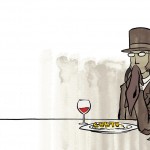Russell Moore writes, “It’s another week and thus another interview with Pope Francis.” Indeed, we are unaccustomed to hearing so very much from the Bishop of Rome, least of all from media sources. Normally we hear lots of words in Italian or Latin uttered from Vatican balconies, homilies and declarations of a head of state and supreme pontiff, and we move on to something else. Not so with Francis. From the moment the white smoke plumed from the sacred chimney, he’s been cutting a different path.
At first it was refreshing. Benedict was seen as a stern (though often warm) theologian who emphasized God’s truth and justice as correctives for a fallen world. Francis eschews signs of wealth and randomly returns letters and phone calls from parishioners. More splashily, he frankly acknowledged the hurt that Christians often cause when insisting on truth and called for love first. It seemed like he was a public relations genius: this is basic Christian orthodoxy (truth not apart from love) and he was careful to avoid slipping into that common heterodoxy of our age (love alone is truth).
This was complicated by the fact that secular media make Francis out to be some kind of Marxist class warrior. Christian churches – not just Catholic ones – have always believed and taught that a lack of charity is the paradigm sin. So it was fun to watch the New York Times and their ilk act like this was some kind of revolutionary teaching.
Alas, the novelty seems to be wearing off. Dr. Moore is a charitable fellow, but even he concludes that this latest interview is “a theological wreck.” Francis calls proselytism “sacred nonsense” insists that the world will be better off if everyone strives toward the good as they conceive it. This echoes his previous call for atheists to “do good” and “we will meet you there.”
Francis’s statements are not merely a difference in emphasis, but of genuine substance. For most Protestants, orthodoxy involves (among other things) the doctrine that God saves only those who believe in Jesus of Nazareth as the Christ. We disagree on how that belief can come into being and who gets credit for it, but even the expressly Arminian denominations will affirm its necessity.
The long Catholic traditions surrounding extra ecclesiam nulla salus (“outside the church there is no salvation“) offer little hope. Observe the careful qualification in statements like this one, from Lumen Gentium (emphasis mine): “Whosoever, therefore, knowing that the Catholic Church was made necessary by Christ, would refuse to enter or to remain in it, could not be saved.” Protestants make salvation and confession a one-to-one correspondence, or argue that faith in Christ is both necessary and sufficient for salvation. Within Catholic tradition, salvation begins and ends at the steps of the church.
I remind myself that I very likely do not know as much about another’s faith as he does. I have had enough long conversations with Catholic friends to know that they aren’t just flakes on this topic, and so has Dr. Moore. The Pope’s ability to capture the public imagination while speaking orthodox Christian truth is, it turns out, more complicated than we wanted to admit. After dealing with the institutional prejudices wrought by selective reporting and journalist bias, we ourselves will tend to hear Francis with Protestant ears. For those of us weary of being labeled as hateful, or accused of bare animus, we latched on to the relief of having a world-prominent Christian leader quoted more accurately vis-a-vis our beliefs. That may have been appropriate, but we must guard against the competing forces of theological nicey-niceyism (a byproduct of our subjectivist culture) and Protestant provincialism.
As the dust settles from the election of this Argentinian Jesuit, some things are certain. For one, we were right to be wary of popular media accounts of the Pope’s statements. The man was a cardinal and is not a dissident in his communion; he is not at odds with his tradition’s anthropology, sexual ethics, or political theology. It is also true that there is much to admire in Francis’s life and work, experiences that foretell his canny leadership style.
But let us not give in to dew-eyed optimism. The divisions that existed before the Council of Trent will not somehow evaporate in a new spirit of ecumenism. We have much in common with our Catholic friends – not the least of which is Trinitarian theism, an unusual creed. And in 2013, after generations of secularization and the culmination of individualism, we stand shoulder to shoulder with Roman Catholics on some of the most important social and political issues of the day. Nevertheless, as the Pope’s high profile remarks teach us, there is a reason we remain a reformation people.
photo credit: JeffyBruno via photopin cc











